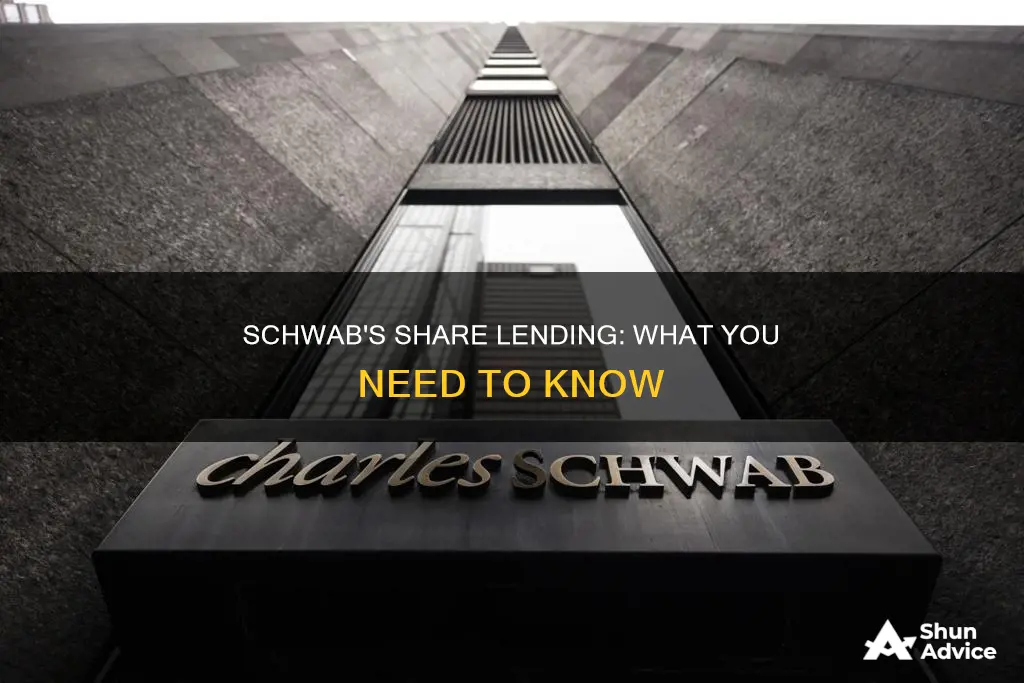
Charles Schwab offers a Securities Lending Fully Paid Program that allows investors to lend out shares they already own to third parties such as brokers, traders, and hedge funds. The program provides an opportunity for investors to earn extra income by receiving a portion of the interest charged by Schwab on loaned securities. While investors retain full ownership of the loaned shares, they may experience downward pressure on the stock price and temporarily lose certain shareholder rights, such as voting rights and standard dividend tax treatment. Schwab's estimated income through this program is $1100 per month, but the actual interest rate offered can vary significantly, with some reporting rates as high as 73%.
| Characteristics | Values |
|---|---|
| Securities Lending Program | Schwab's Securities Lending Fully Paid Program |
| How it works | Shareholders loan out shares they already own to Schwab, which then loans them to third parties (brokers, traders, hedge funds) for a fee. |
| Interest | Accrues daily and is paid monthly. The rate varies with market demand. |
| Collateral | Borrowers must put up collateral equal to or exceeding the amount borrowed. |
| Risks | Potential downward pressure on the stock price; temporary loss of voting rights; different tax treatment on dividends. |
| Opting out | Call the Securities Lending Services team at 877-793-8872 between 8:30 a.m. and 4:00 p.m. EST. |
What You'll Learn

How does Schwab's Securities Lending Program work?
Schwab's Securities Lending Fully Paid Program allows clients to lend out securities they already own to earn extra income. The program is by invite only, and not everyone will qualify. Households must have at least $100,000 in assets held in Schwab accounts.
Once enrolled, a supplemental account is created as a clone of the original account. This account will house the securities on loan, and if the loan is terminated, the shares will be returned to the original account. If the securities on loan are sold, the loan will terminate, and the client will stop receiving loan interest.
Schwab typically loans the shares to third parties (brokers, traders, hedge funds) for a fee, which is then shared with the client. The interest rate is based on market demand and will be paid on a monthly basis. The interest is accrued daily and can be viewed online.
There are some risks associated with the program. When securities are borrowed to facilitate a short sale, there is a chance that the market price of that security will go down. When lending a dividend-paying security, the lender may receive a cash-in-lieu instead of their regular dividend payment, which is taxed at a different rate. The lender also temporarily forfeits their voting rights during the loan period.
SBI Loan Closure: Early Exit Fees and Charges?
You may want to see also

What are the risks of loaning shares?
There are several risks associated with loaning shares. Firstly, there is a chance that the market price of the security will decrease when the borrowed shares are used for short selling, which is a high-risk strategy. Short sellers aim to profit from a decline in the share price, so their activity could negatively impact the value of your holdings. Additionally, when you lend a dividend-paying security, you may receive a cash-in-lieu payment instead of your regular dividend; these payments are taxed at your marginal tax rate, which is typically higher than the dividend rate.
Another risk to consider is counterparty default, where the borrower of the shares defaults on their obligations and fails to return the borrowed securities. In this case, there is a risk that the collateral posted to the lender will be insufficient to cover the cost of the loaned shares. Furthermore, loaned shares are not protected by the Securities Investor Protection Corporation (SIPC), so there is no insurance against broker default. While this event is unlikely, it is an important consideration when deciding whether to participate in share lending programs.
Loaning shares also results in the temporary loss of voting rights associated with those shares. Although you can recall the loan to regain your voting privileges, this is an added inconvenience and risk to consider. Additionally, there may be discrepancies or a lack of protection stipulated in the Securities Lending Agreement, as highlighted by an expert.
Lastly, there is a risk that the borrowed shares will be used by short hedge funds to drive down the share price. This can result in a significant loss that may outweigh any interest earned from loaning the shares. Therefore, it is crucial to carefully evaluate the potential risks before participating in share lending programs.
How SAP Influences Loan Eligibility and Access
You may want to see also

What are the benefits of loaning shares?
Schwab's Securities Lending Fully Paid Program allows investors to loan out securities they already own to generate additional income. The program is beneficial to investors as it provides an opportunity to earn extra income from securities they already own without selling them. The interest accrued is paid on a monthly basis and is based on market demand. This allows investors to turn inactive investments into potential profit generators.
Another benefit of loaning shares is that it provides liquidity to the market. By loaning out shares, investors can facilitate short-selling, a high-risk strategy that allows investors to seek potentially high returns from price declines. Additionally, when institutions borrow shares, they must put up collateral, typically 100-105% of the value of the shares borrowed, which serves as a form of risk mitigation for the lender.
Loaning shares can also help investors hedge their portfolios and limit potential losses. For example, if an investor lends a security to a borrower for a fee, they will retain that fee even if the share's value drops. This allows investors to earn a return from their securities without selling them.
However, it is important to consider the risks associated with loaning shares. When lending shares, investors may lose their voting rights, and there may be negative tax implications. Additionally, there is a risk of counterparty default, and the share price may be driven down by short-selling. Therefore, it is essential for investors to carefully consider the potential benefits and risks before participating in securities lending programs.
Santander's Bridging Loan Options: What You Need to Know
You may want to see also

How does Schwab decide who to loan shares to?
Schwab's Securities Lending Fully Paid Program allows clients to loan their eligible shares to other investors or financial institutions. The principal reason for borrowing securities is to facilitate short sales; however, Schwab also lends securities to facilitate other trading strategies or to fulfill settlement obligations.
The SLFP program allows eligible clients who do not have a margin debit balance in their account to earn income by loaning securities to Schwab. Fully paid securities are securities not being used as collateral for a margin loan. In addition to being fully paid, the securities Schwab borrows are considered in high demand by other investors (hard-to-borrow securities) for short sales.
Schwab typically loans the shares to third parties (brokers, traders, hedge funds) for a fee, which is then shared with the client. The interest you earn is based on market demand and will be paid on a monthly basis.
There are some potential risks that you should be aware of before participating in Schwab's Securities Lending Fully Paid Program. When securities are borrowed to facilitate a short sale, there's a chance that the market price of that security will go down. When you lend a dividend-paying security, you may receive a cash-in-lieu instead of your regular dividend payment, which is taxed at a different rate. When you loan your shares, you temporarily forfeit your voting rights. However, you can always recall the loan to regain your voting privileges.
Santander Loan Modifications: What You Need to Know
You may want to see also

How much money can be made from the program?
The amount of money that can be made from the Charles Schwab Securities Lending Fully Paid Program depends on market demand and will be paid on a monthly basis. The interest rate is divided by 365 days to get a daily interest rate. Money is paid monthly but accrues daily, including on weekends and holidays.
Schwab typically loans the shares to third parties (brokers, traders, hedge funds) for a fee, which is then shared with you. The interest you earn is based on market demand and will be paid on a monthly basis.
For example, if you were to lend your HOOD shares to Schwab, you would be getting paid a 68% fee, while they collect 136% from the borrower and share 50/50 with the share owner.
However, it is important to note that the stock price may go down, so investors should be comfortable with this risk. There is also a chance that the market price of the security will go down when securities are borrowed to facilitate a short sale. Additionally, when you lend a dividend-paying security, you may receive a cash-in-lieu instead of your regular dividend payment, which is taxed at a different rate.
Santander Loans: What You Need to Know
You may want to see also
Frequently asked questions
The program allows investors to loan out shares they already own to third parties (brokers, traders, hedge funds) for a fee, which is then shared with the investor.
There is a chance that the market price of the security will go down. When you lend a dividend-paying security, you may receive a cash-in-lieu instead of your regular dividend payment, which is taxed at a different rate. You will also lose your voting rights.
The interest rate offered by Schwab varies, with some people reporting offers of 73% interest, while others state that Schwab estimates $1100 per month of income. The rate is based on supply and demand.
You can call the specialized service team at 877-793-8872 or talk to your Schwab financial consultant.







